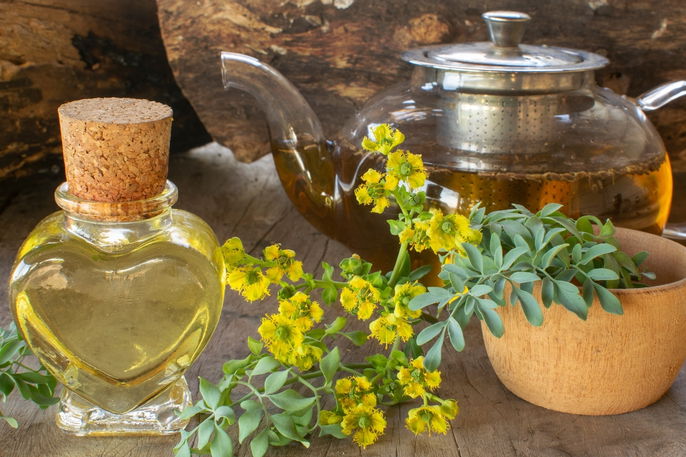Rue (Ruta graveolens) is a medicinal plant with anti-inflammatory, vermifuge (anti-parasite), and analgesic properties. It is used as a complimentary therapy for the treatment of varicose veins, intestinal worms, conjunctivitis, toothache, and headache.
The rue plant is rich in bioactive compounds like rutin, arborinine, and graveoline, which are the source of its medicinal properties. Rue can also be used for menstrual (period) regulation in some cases.
Rue comes in the form of fresh or dried flowers and leaves and can be made into a tea, tincture, or poultice. It can be found at health food stores and farmers' markets.
Always consult a doctor or medicinal plant specialist before starting herbs for medicinal purposes.

Health benefits
Rue plants can be used to for:
1. Menstrual regulation
Rue can have an emmenagogue effect, and may therefore be used to regulate your period and treat problems like heavy bleeding or amenorrhea.
Rue also works as an analgesic and can be used for the relief of menstrual cramps. Read about natural remedies for menstrual cramps.
2. Treatment of intestinal worms
The rue plant has anthelmintic properties and is commonly used to help treat intestinal worms such as ascaris roundworms and pinworms.
3. Treatment of varicose veins
Rue contains rutin, a flavonoid that improves blood circulation and possesses anti-inflammatory and vasoprotective properties. The rue plant may therefore be helpful in the treatment of varicose veins.
4. Elimination of scabies and lice
Rue contains rutin and quercetin, two bioactive compounds with pest-repelling properties that can help combat lice. Learn more about home remedies for lice.
In addition, rue also has calming properties and can be applied to the skin to relieve itching and irritation from a scabies infection. Read about home remedies for scabies.
5. Adjunct therapy for conjunctivitis
Rue contains antimicrobial, antibacterial, anti-inflammatory, and antifungal properties and may be used in the form of an eyewash to help with the treatment of conjunctivitis.
6. Pain relief
Rue can help relieve rheumatic pain, headache, toothache, earache, and stomachache due to the analgesic and anti-inflammatory properties of its bioactive components, specifically myrcene and quercetin.
7. Blood sugar control
The rue plant is rich in flavonoids and helps with glycemic control by improving insulin function. This is the result of antioxidant properties that protect the pancreatic cells responsible for the production of insulin.
8. Diuresis
Quercetin gives rue a diuretic effect, stimulating the elimination of excess fluid through urination, thus reducing swelling and fluid retention.
9. Strengthening the immune system
Arborine and coumarin are two compounds found in the rue plant that act as antihistamines and anti-inflammatories, helping to strengthen the immune system.
In addition, rutin facilitates the absorption of vitamin C, improving the function of the body's defense cells to better protect against microorganisms like viruses, bacteria, and fungi.
Instructions for use
Rue is mainly consumed in the form of a tea, and can be prepared using fresh or dried flowers and leaves. This tea can be ingested, applied to the skin, or used as an eyewash or hair rinse.
Rue can also be used in the form of a poultice for the treatment of rheumatic pain, varicose veins, or wounds. To make, grind 2 Tbsp of fresh rue leaves into a paste and apply directly to the affected area.
Rue may also come in the form of a tincture, which can be ingested or applied to the skin in cases of scabies and psoriasis. Learn how to make a tincture.
Recipe for rue tea
While all parts of the rue plant can be used, tea is typically made from the leaves, where the majority of the plant's properties are stored.
Ingredients:
- 1 tsp (2 to 3 g) of dried rue leaves;
- 1 L of water.
Directions:
Bring the water to a boil and remove from the heat. Add the rue leaves, cover, and let steep for 5 minutes. Strain the tea and drink. Recommended consumption is up to 1 cup daily.
Side effects
Consuming large quantities of rue can cause intoxication, tremors, convulsions (seizures), hemorrhage, vomiting, cramps, diarrhea, decreased heart rate, constricted pupils, and sleepiness.
In addition, it is important to avoid sun exposure when applying rue to the skin in order to prevent sunburn and contact dermatitis.
Rue should be used only as directed by a doctor or herbal medicine specialist.
Contraindications
Rue is contraindicated in pregnancy due its abortifacient properties (meaning it can cause an abortion). It is also contraindicated in breastfeeding. Children and people with renal (kidney) disease should not consume rue.
People taking antihypertensives (blood pressure medication), digoxin, or dobutamine should consult a doctor before taking rue, as the rue plant can alter the effects of these medications.






























